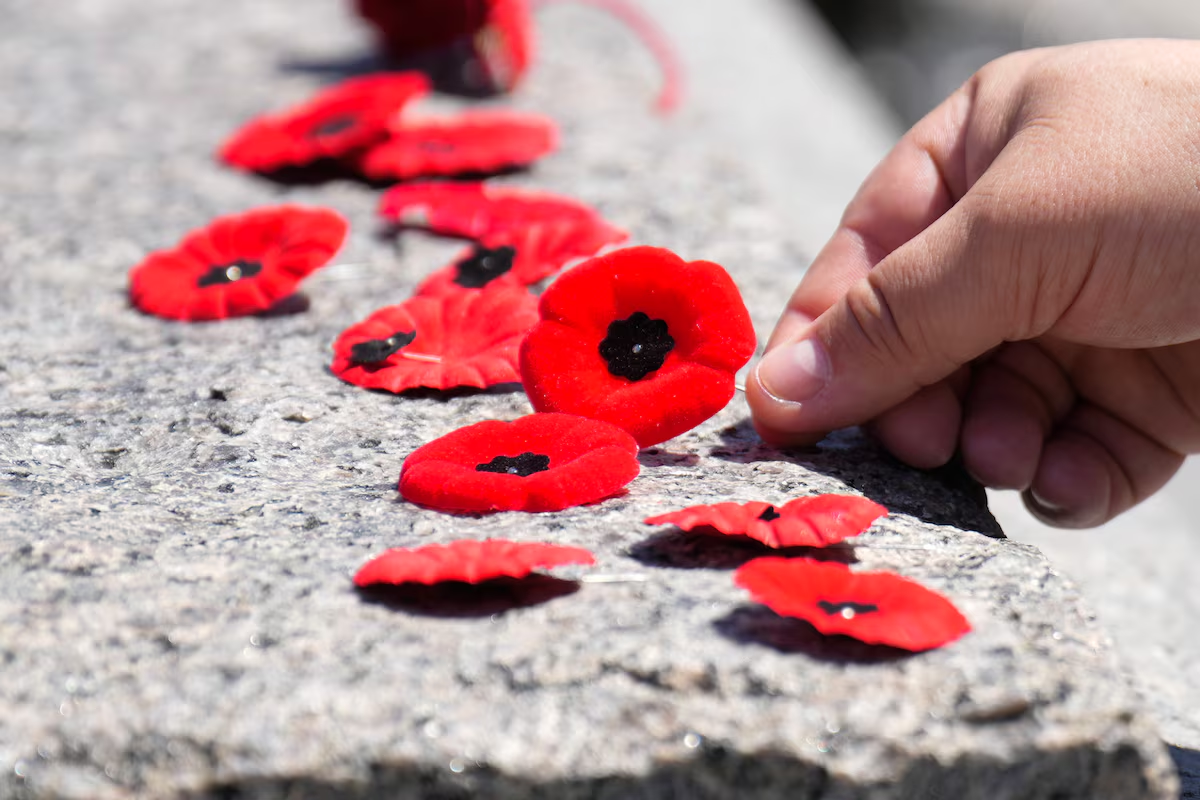Should poppies be allowed in Canadian courts?

Open this photo in gallery:
Most provincial and territorial courts do not expressly prevent individuals from donning poppies, but Nova Scotia and Saskatchewan’s rules differ.Adrian Wyld/The Canadian Press
The heads of Nova Scotia’s two top courts say they support the discretionary power of judges to ban legal staff from wearing poppies on their clothing, adding further tension to an unfolding debate over the role of the Remembrance Day symbol in Canadian courtrooms.
The issue has come to the fore after the premiers of Nova Scotia and Saskatchewan condemned different instances in their provinces last week of some individuals being told by judges they cannot wear poppies.
In a joint statement Sunday, Nova Scotia Supreme Court Chief Justice Deborah Smith and Provincial Court Chief Judge Perry Borden said while they understand the desire to pay respect to veterans, allowing for such symbols during courtroom proceedings could tarnish their necessary impartiality.
The judges provided the example of a non-veteran charged with the assault of a veteran walking into a courtroom where staff are wearing poppies, stating the situation could make the accused doubt the legal process. They did not say if the example was hypothetical or based on an actual case.
“The decision of a judge not to allow symbols of support such as the poppy to be worn by court staff is not intended, in any way, to undermine or diminish the tremendous respect that we have for those who have served,” Chief Justice Smith and Justice Borden said. “It is to ensure that all Canadians know that they are entering an unbiased and neutral space.”
Opinion: It’s been 80 years, but I’ve never forgotten my time in Canada during the war
But Nova Scotia Premier Tim Houston said the poppy is not a political statement, indicating that he is willing to introduce new legislation enshrining the right to wear the symbol in workplaces – including courtrooms – if necessary.
“This is disgusting,” he wrote Friday in a lengthy post on social media, declining to comment further on Sunday. “The judges who issued this order are wrong. While I respect the independence of the judiciary, I respect veterans, the very people who made the ultimate sacrifice defending our country, our values and our democracy, more.”
Andrew Preeper, communications director of the Nova Scotia Judiciary, which represents judges across every level of court in the province, clarified that the courts have not forbidden members of the public from wearing poppies.
And he said there has been “no order or directive” about poppies, unlike what the Premier said. “Staff who wished to wear poppies in the courtroom were advised to speak with the presiding judge and conversations, as needed, have occurred around that specific topic,” Mr. Preeper said in an e-mail to The Globe and Mail.
It is within the discretion of a presiding judge to allow for such limitations, he said.
“Everyone appearing in court must feel that their case will be heard fairly and without bias. As a result, all judges and staff are expected not to wear any symbols of support in the courtroom.”
In Saskatchewan last week, Saskatoon prosecutor Lana Morelli told local media outlets that she was informed by e-mail at the start of a trial she was not allowed to wear a poppy. She told The Globe she was disappointed she could not honour veterans such as her grandparents.
Saskatchewan Premier Scott Moe said his government has already enshrined the legal right for people to wear poppies in the workplace with a provincial law in 2023.
“While the Court of King’s Bench has jurisdiction to determine appropriate attire, our government feels wearing a poppy shows respect to our service members who have defended our nation’s freedoms,” he said in a statement, emphasizing the symbol “should be allowed in the courtroom.”
Christeen Shire, communications officer for Saskatchewan’s courts, provided The Globe with its policy on attire for lawyers, all of whom are required to wear gowns and robes. The guidelines do not give any room for modifications, except under certain personal circumstances, for which a request for alteration must be made to a clerk or registrar in advance.
“The Court does not provide interpretation of policy or protocol,” Ms. Shire stated.
The Globe reached out to all the provincial and territorial courts across Canada to poll their policies on poppies in courtrooms.
British Columbia, Alberta, Manitoba, Ontario, Quebec, Yukon and the Northwest Territories confirmed that none of their guidelines expressly prevent individuals from donning poppies.
Indigenous veterans on fighting battles, both at home and abroad
“Counsel have appeared at all levels of court wearing a poppy in honour of Remembrance Day and we anticipate counsel continuing to do so,” said Manitoba courts’ spokesperson Sandy Kuchinski.
That was also the case in Ontario, according to Jack Fazzari, spokesperson for the province’s Attorney-General Doug Downey.
“We fully expect that poppies are permitted to be worn no matter where you are in Ontario – including in courtrooms,” Mr. Fazzari said, citing provincial legislation passed in 2021 that guarantees every employee can wear the symbol in their workplace.
New Brunswick, Newfoundland and Labrador, Prince Edward Island and Nunavut did not confirm their policies.
Dwight Newman, a professor at the University of Saskatchewan and Canada Research Chair in Rights, Communities and Constitutional Law, believes the courts should reverse their practices before risking any erosion of public confidence.
“I understand the motive to uphold a principle against political symbols in such impartial settings. But I fear the courts are taking this too far by misapplying that principle to poppies, which are very different than any other symbol,” he said in an interview.
“What we now have are political actors speaking up on this and suggesting further action that could affect judicial independence. It would be much better if the courts resolved this on their own rather than being forced to do so. The latter will cause jurisdictional problems we definitely don’t want within our systems.”
With reports from Lindsay Jones and The Canadian Press





